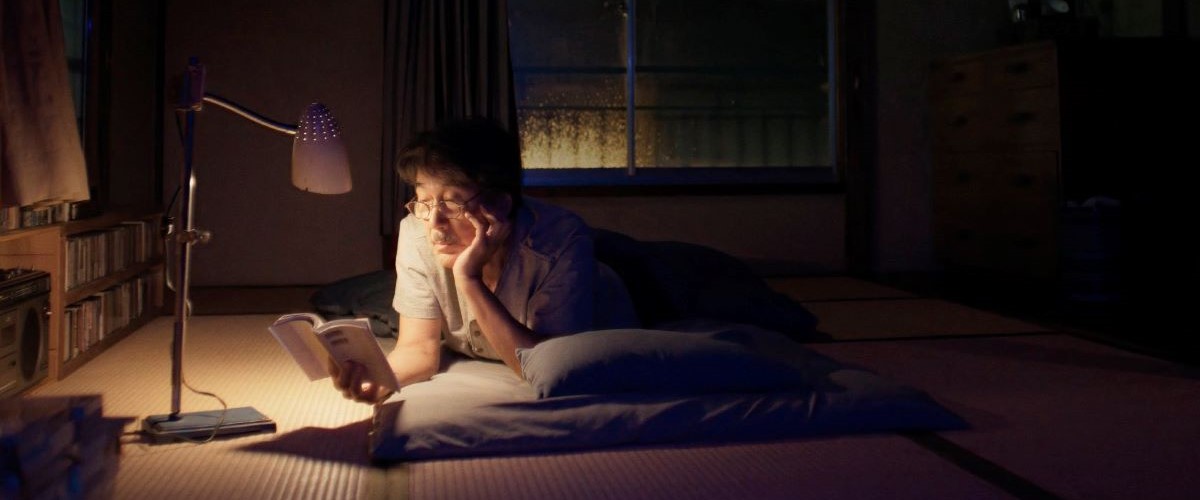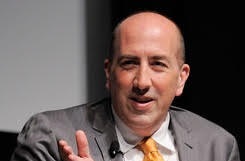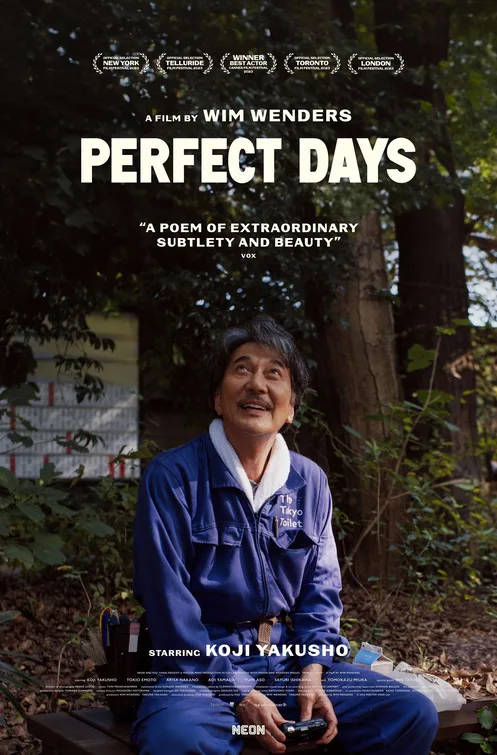The peripatetic German-born director Wim Wenders, now 78, has drawn nearly as much inspiration from Japan over his career as he has the U.S. Two of his 1980s documentaries, “Tokyo-ga” and “Notebook on Cities and Clothes,” are set there, as is a section of his 1991 epic elegy for life on earth, “Until the End of the World.” Certain facets of Asian philosophy suggest Japan as a place in which one might seek serenity, or live out ideas of serenity, and for Wenders the implacable camera style of Japanese director Yasujiro Ozu has often been a model. For this late film, “Perfect Days,” Wenders depicts the orderly, ascetic, but culturally rich life of an older Tokyo resident who works in sanitation. Venerable Japanese actor Koji Yakusho (“Shall We Dance?”) plays Hirayama, who cleans high-end public toilets in the fashionable Shibuya district of Tokyo. A trim man with salt and pepper hair and a meek manner under which one sees a powerful charisma that’s been put under a willed bushel, he gets up every morning in his modest apartment and drives a van into town, playing his exceptionally curated cassette collection on the car stereo.
Tunes include The Animals’ version of “The House of the Rising Sun;” “Pale Blue Eyes” by The Velvet Underground, and “Sunny Afternoon,” from The Kinks. The Kinks have an important place in Wenders’ filmography; in his classic “The American Friend,” the doomed framer played by Bruno Ganz sings along softly with that group’s “Too Much on My Mind” in his atelier during one of his imperfect days. And, of course, Velvet Underground leader Lou Reed has another song on this soundtrack (guess which) and appeared in Wenders’ sprawling contribution to post-Cold-War international relations, “Faraway So Close!” which also featured a cameo from Mikhail Gorbachev. Alone in his car, looking at the sun coming up, enjoying the music, Hirayama seems to glory in just being present in this moment of life.
And while this is a largely solitary life, there is something about its particulars that speaks to a perhaps specifically male form of wish fulfillment. That is, the desire for a “meaningful” solitude that goes hand in hand with a wish, after a certain age, to just be let be by the world itself. Hirayama only listens to music on cassette; in a more demonstrative kind of character, this would seem a near-insufferable emblem of hipster fetishization (and this is something the movie actually takes up), but with Hirayama, you pick up more of an “everything in its right place” vibe.
Not much happens. There’s a lot of beauty in Hirayama’s world, including the parks in which the designer toilets are situated, and a dark little bar-restaurant and its quiet female proprietor with whom Hirayama forms a halting affinity. At night our hero reads, and when he dreams, he dreams in black and white, in imaginative sequences done in collaboration with Wenders’ wife Donata, a photographer.
Some critics have deemed Wenders’ squeaky-clean look at the life of a guy who, we repeat, cleans toilets for a living, as somewhat evasive. It’s true that Wenders takes a pretty scrubbed approach to sanitation work. Which to a certain extent reflects the fact that these installations are practically art objects, but nevertheless…
Not to get too gross or salty about it, but I’d say, given “Kings of the Road,” I don’t think Wenders owes us anything in the shit department. (In this late ‘70s film the lead character relieves himself on a beach on screen; the action is depicted naturalistically and nonchalantly, in long shot; nevertheless, one commenter on Roger’s review pronounced the scene as “sick.” Damned if you do, damned if you don’t, I guess.)
But beyond what he does not show, there are a few critics I’ve seen who can’t abide the concomitant attitude of Hirayama and the movie itself. Which I took to be “acceptance is the key.” For some the distinction between acceptance and complacency is non-existent, and I get that. Nevertheless, I was consistently moved by this picture and by the serenity sought and often found by its protagonist.
In any event, the movie has its mysteries, and these mysteries look to another side of life, one not so serene. The patience and tolerance that Hirayama shows his chowderhead colleague Takashi (Tokio Emoto) is extreme enough to border on self-abnegation. When Hirayama’s teenage niece shows up at his door, we get a hint of familial unease. The girl is mildly curious about her uncle’s way of life, and borrows one of his book, a collection of Patricia Highsmith short stories. A little later, the girl, Niko, tells Hirayama that she particularly admired the story “The Terrapin.” The movie itself doesn’t divulge this, but that story is about a kid whose mother boils a turtle (which indeed had been brought home to be eaten); the kid retaliates by stabbing his mother to death. When Hirayama’s sister shows up to claim her daughter, the dialogue between siblings alludes to a former mode of life very different from Hirayama’s current situation. Is Hirayama doing a living amends? And if so, for what? “I like to think you killed a man, it’s the romantic in me,” Captain Renault says to Rick Blaine in “Casablanca,” speculating as to what Rick has been running away from. One again thinks of the Highsmith-based “The American Friend,” and the anti-romantic killing in that film, and wonders what Hirayama might be running from.
The movie reminded me of what Peter Bogdanovich said of Ford’s “The Man Who Shot Liberty Valance”: that it “is not a young man’s movie; it has the wisdom and poetic perceptions of an artist knowingly nearing the end of his life and career.” The wisdom and poetry here are just as real and just as thoroughly felt.




















